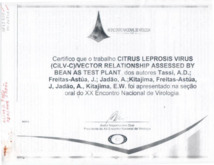Citrus leprosis virus (CILV-C) vector relationship assessed by bean as test plant.
Citrus leprosis virus (CILV-C) vector relationship assessed by bean as test plant.
Author(s): TASSI, A. D.; FREITAS-ASTÚA, J.; JADÃO, A.; KITAJIMA, E. W.
Summary: The study of the virus/vector relationship in the citrus leprosis pathosystem has been hampered by the fact that the development of the lesions after the inoculation of the virus by Brevipalpus phoenicis mite takes 4-6 weeks on sweet orange leaves. The discovery that necrotic lesions caused by the CiLV-C develop 5-6 days after mite inoculation provided an excellent system to obtaín some parameters of the virus/vector relationship such as: virus acquisition feeding period (AFP), virus inoculation feeding period (IFP) and the percentage of viruliferous mites in a population. The experiments indicated that AFP is 2-3 days, IFP, 1-2 days, and that an average of 40% of B. phoenicis mites collected from a colony kept on CiLV-C infected fruits were viruliferous. A statistical analysis indicated that lesions on bean leaves are clustered. suggesting that the mites tend to feed in nearby areas. Experiments also confirmed previous data revealing that all the developmentai active phases of the mite are able to transmit the virus. Preliminary experíment by daily transter of the mites showed that viruliferous mites are able to transmit the virus at least after 3 transfers, without access to a virus source. Confirmation that the lesions were caused by CiLV-C was made by examination of the sections by transmission electron microscopy to detect cytopathology characterístic to CiLV-C infection and by RT-PCR using specific primers for CiLV-C.
Publication year: 2009
Types of publication: Abstract in annals or event proceedings
Unit: Embrapa Cassava & Fruits
Keywords: Citrus, Doença de Planta
Observation
Some of Embrapa's publications are published as ePub files. To read them, use or download one of the following free software options to your computer or mobile device. Android: Google Play Books; IOS: iBooks; Windows and Linux: Calibre.
Access other publications
Access the Agricultural Research Database (BDPA) to consult Embrapa's full library collection and records.
Visit Embrapa Bookstore to purchase books and other publications sold by Embrapa.

